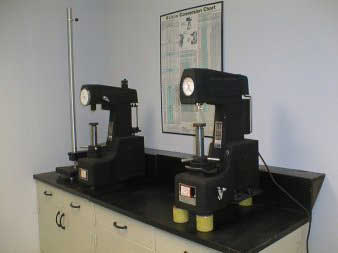Rockwell Hardness Testing
Abrasion Testing
Accelerated Life Testing
Chemistry Laboratory
Computer Modeling
Salt Spray Testing
Density
Electrical Properties
Electron Microscopy
Experimental Foundry
Failure Analysis
Hardness Laboratory
Heat Treatment Studies
Light Microscopy
Lubrication Testing
Machine Shop
Materials Databases
Mechanical Testing
Metallography
Paint & Coatings
Product Testing
Rolling Mill
Thermal Testing
HARDNESS LABORATORY
The following is a list of hardness measuring instruments at Touchstone:
Rockwell Hardness Testing

Touchstone’s Rockwell hardness tester is equipped with Brale®, 1/16″, and 1/8″ ball indenters. The hardness tester is capable of all standard Rockwell scales, B and C for harder metals (iron and steel…), and A, D, E, F, G and K for softer metals. The “A”, “B”, and “D” ranges are used for softer materials like some carbon steels, brass, bronze, aluminum, etc.
Sample preparation is critical to proper hardness determinations. It is necessary to make the specimen surface to be measured flat and parallel to the opposite surface. This step cannot be overstated because the Rockwell determinator is able to detect differences in depth of penetration as little as 0.00080″ on the standard ranges and 0.00040″ on the superficial ranges. A rough surface will deform more easily than a smooth one and erroneously low readings will result from measurements performed on such a surface. Conversely, a surface that has been work hardened by improper grinding will give excessively high readings. Hardness can be performed on curved pieces such as pipes, and rods. Results are corrected for the curvature.

